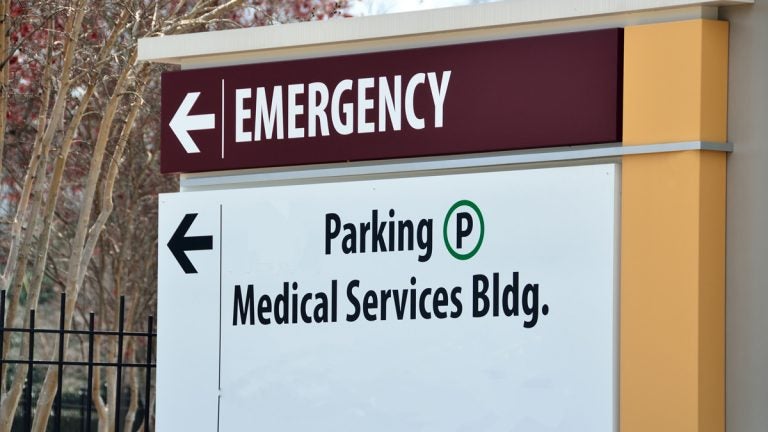Report: Low-income N.J residents are more likely to seek health care at hospitals

(Shutterstock)
Low-income New Jersey residents are more likely to make hospital trips that could be avoided, according to a new study.
The Rutgers Center for State Health Policy report found that for every 1-percent increase in per capita income there was .85-percent reduction in avoidable hospital visits. Those numbers were based on Census data for every ZIP code in the state .
The report may have important implications for organizations aiming to improve coordination and increase accountability for healthcare in low-income communities.
In low-income communities that fit the pattern for excessive hospital visits there should be a greater focus on addressing social and economic factors that have an impact on people’s health, the report said.
But in those lower-income communities where there are differences between the expected and actual number of avoidable hospitalizations, the healthcare providers themselves may be able to make direct improvements, according to the report.
The report analyzed how hospital use in 13 low-income communities differs from what would be expected based on the socioeconomic characteristics of the people who live in those areas.
The report’s authors believe that this data can be used to guide potential strategies for eight healthcare coalitions that recently applied to be part of the state’s Medicaid Accountable Care Organization demonstration project.
This project will pay participants more if they’re able to reduce healthcare costs while still improving quality.
Associate research professor Derek DeLia, who co-wrote the Rutgers report with Kristen Lloyd, said some communities had hospitalization rates that were almost exactly what the analysis predicted. This was especially true of Camden, which has the highest rate of avoidable hospitalizations in the state.
DeLia said this analysis suggests that the best way to reduce Camden’s high hospitalization rate is to address such factors as job training, better housing and more accessible transportation.
“There isn’t a whole lot you can do to make the health system that much better,” when a community’s health outcomes track so closely with problems associated with demographics, DeLia said.
DeLia said that coordination of healthcare with the steps to address social factors is an area where Medicaid ACOs could make a significant difference.
The statewide Medicaid ACO is expected to launch later this year, with an eye toward possibly expanding if it’s successful. Gov. Chris Christie expressed support for the program in his State of the State address in February.
Measures aimed at connecting residents with opportunities to improve their lives “are not traditionally medical but they have such a big effect on medical uses and medical spending,” DeLia said.
Some communities had far more avoidable hospitalizations than the analysis of their socioeconomic characteristics would predict. These include Jersey City and Asbury Park.
DeLia said this might reflect inefficiencies and areas in need of improvement within the local healthcare services. While neither of those communities has coalitions that are applying for the Medicaid ACO program, DeLia said providers in those areas could learn from the data.
The report was funded by the nonprofit Nicholson Foundation, which aims to improve the quality and affordability of healthcare for vulnerable populations in the state. Foundation Deputy Director Joan Randell said the report and other research by the Rutgers center is important, and relates to other projects that the foundation is supporting in the state – such as the Medicaid ACO project — as it seeks to transform how healthcare is delivered and funded.
“You can’t really transform a system if you don’t really have good information,” Randell said.
She noted that the foundation has long supported Dr. Jeffrey Brenner’s efforts to improve healthcare in Camden through the Camden Coalition of Healthcare Providers, which is applying to be a Medicaid ACO.
While a separate Rutgers report last year found that Camden had the highest avoidable hospitalization rate in the state, the new report provides a potential explanation: namely, that socioeconomic factors are the main cause.
Randell said that knowing the effect of socioeconomic factors could advance a conversation between healthcare providers and policymakers about how to better address them.
“I think it will open people’s eyes about the role of employment and income in helping people move up the economic ladder,” she said of the report.
The foundation also is working with Christie’s administration to fund employment and job-retention programs for people who appear in drug court, which could also help improve the health of that segment of the population in the future by providing more economic stability, Randell noted.
“I think these connections are beginning to be made, so it’s a sea change” that can be built on the data in analyses like the new report, she said.
The socioeconomic factors analyzed in the report include: per capita income and the percentage of residents who are uninsured; who speak English poorly or not at all; who receive federal payments for low-income residents who are aged, blind or disabled; and who are black or Hispanic. The analysis also considered the percentage of male adults who were employed.
At least one provider found that the report matches her experience. Dr. Ruth Perry, the executive director of the Trenton Health Team, said her organization has had success in reducing avoidable hospitalizations dramatically when it’s been able to obtain housing for its patients.
The organization is one of the eight Medicaid ACO project applicants. Its results were similar to those reported for Camden in the study and largely in line with its socioeconomic characteristics.
“When we talked with residents, we heard: ‘I have a primary-care provider and insurance, but no one ever taught me how to use a glucometer, how to take my insulin or what foods to eat,'” said Perry, describing different strategies to reduce the devastating, chronic effects of diabetes. “Without this type of knowledge, avoidable hospital utilization will continue.”
The Trenton Health Team is aiming to address these issues through its community health improvement plan; by managing individual patients’ cases; and by providing more patient education in outpatient clinics, Perry said.
_____________________________________
NJ Spotlight, an independent online news service on issues critical to New Jersey, makes its in-depth reporting available to NewsWorks.
WHYY is your source for fact-based, in-depth journalism and information. As a nonprofit organization, we rely on financial support from readers like you. Please give today.




